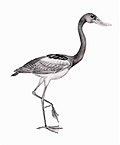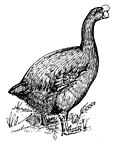| Dunstanetta johnstoneorum Temporal range: Early Miocene
| |
|---|---|
| Scientific classification | |
| Domain: | Eukaryota |
| Kingdom: | Animalia |
| Phylum: | Chordata |
| Class: | Aves |
| Order: | Anseriformes |
| Family: | Anatidae |
| Genus: | †Dunstanetta Worthy et al., 2007 |
| Species: | †D. johnstoneorum
|
| Binomial name | |
| †Dunstanetta johnstoneorum Worthy et al., 2007
| |
Dunstanetta johnstoneorum is a genus and species of extinct duck from the Miocene of New Zealand. It was described from fossil material (a distal left humerus) collected from a Saint Bathans Fauna site on Home Hills Station, in the lower Bannockburn Formation of the Manuherikia Group, in the Manuherikia River valley in the Central Otago region of the South Island. The genus name refers to the Dunstan Range, the mountains of which overlook the fossil site. The specific epithet honours Ann and Euan Johnstone of Home Hills Station.[1]
References
[edit]- ^ Worthy TH, Tennyson AJ, Jones C, McNamara JA, Douglas BJ (2007). "Miocene waterfowl and other birds from central Otago, New Zealand" (PDF). Journal of Systematic Palaeontology. 5 (1): 1–39. doi:10.1017/S1477201906001957. hdl:2440/43360. S2CID 85230857.


Well, that’s interesting to know that Psilotum nudum are known as whisk ferns. Psilotum nudum is the commoner species of the two. While the P. flaccidum is a rare species and is found in the tropical islands. Both the species are usually epiphytic in habit and grow upon tree ferns. These species may also be terrestrial and grow in humus or in the crevices of the rocks.
View the detailed Guide of Psilotum nudum: Detailed Study Of Psilotum Nudum (Whisk Fern), Classification, Anatomy, Reproduction